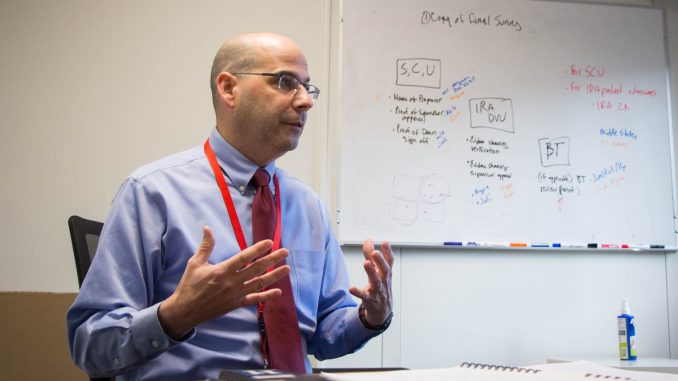
Temple’s data verification unit, created in the wake of last year’s Fox School of Business’ rankings scandal, will eventually need to scale back the amount of data it reviews as the current amount is time-consuming and financially taxing, said Alex Diaz, Temple’s chief compliance officer.
“We’re going to have to innovate because this amount of review is not long-term sustainable,” Diaz said. “It’s a tax, not in terms of just money, but in terms of money, time, resources, people.”
The scope of the unit’s review currently includes any document with statistics, demographics or other data types, as well as any data submitted to accreditation bodies, the government and rankings organizations, according to a university memo.
The unit, which launched on July 1, acts as a “safety net” when it comes to ensuring the accuracy of Temple’s external data, Diaz said. Within the unit, Diaz oversees three full-time employees in addition to temporary staff contracted through Baker Tilly Virchow Krause, LLP, a tax firm, who are brought on during busy periods, he said.
The business school’s ranking scandal unraveled after U.S. News and World Report announced it had “significantly overstated” data for its Online MBA program in January 2018. An independent review by the law firm Jones Day later found the school had grown rankings-focused in the years leading up to the scandal and data from several programs at the business school had been falsified.
To reduce the possibility of a similar situation happening, the DVU required each school, college and office at Temple to create internal review processes before sending data to the unit, Diaz said.
Don Heller, the senior vice dean of the Klein College of Media and Communication, said he supports having “another set of eyes” look at data but wants the unit to allow individual colleges to review and publish some materials, like marketing brochures, on their own.
“It’s getting the balance between what really ought to be verified at the school or be verified [by the unit],” Heller said.
“It’s still too much [risk],” Diaz said. “Soon, at some point, we’re going to have to say, ‘You know what, we’re willing to live with a little bit different amount of risk.’”
“When we can start throttle back will depend on when we start producing data that we are more comfortable with, are accurate, and don’t require this level of supervision,” he added.
The DVU could reduce the amount of data it reviews by creating standard templates for marketing materials, Diaz said.
Jennifer Ibrahim, the associate dean for academic affairs for the College of Public Health, said the DVU requires more documentation than the university previously did to review data, which has slowed down the College of Public Health’s timeline for submitting accreditation reports.
“If I send a report forward that says ‘We have 100 students,’ I need to also send a spreadsheet that lists 100 active students … I have to submit documentation on how many students, and then broken out by gender, race, ethnicity, and full time, part time, in state, out of state,” Ibrahim said.
“I think some of the issues are, the problem occurred in one school, and then these rules are being applied blanket across all the schools,” she added. “Our college has never had a problem, and we have the most accreditations in the university.”
The DVU aims to complete reviews within three weeks, Diaz said, though more urgent requests are prioritized and completed in a shorter time.
“I can’t imagine anybody being thrilled at the idea of, ‘Hey, I’m going to make it slower and probably more expensive,’” Diaz said. “But I will say, that at least since I’ve been involved with DVU … I have very much felt that [Temple] is very supportive of what we’re trying to do.”



Be the first to comment